Chronic Kidney Disease: Risk Factors, Symptoms, Assessment, Biochemical Abnormalities, and Treatment
VerifiedAdded on 2023/06/16
|9
|2277
|319
AI Summary
This report analyzes a medical case of Chronic Kidney Disease (CKD) and covers the risk factors, symptoms, assessment process, biochemical abnormalities, and treatment options for CKD.
Contribute Materials
Your contribution can guide someone’s learning journey. Share your
documents today.
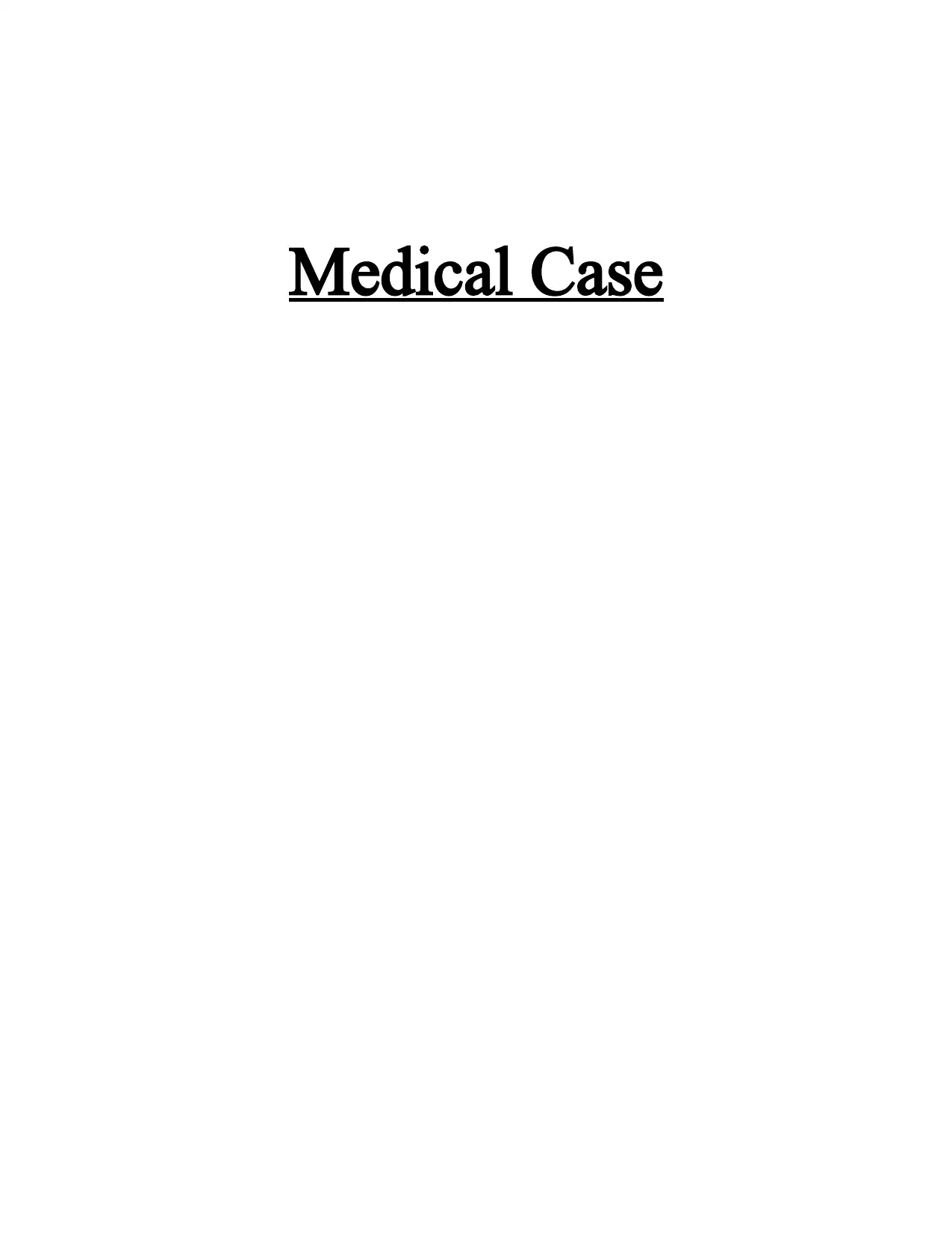
Medical Case
Secure Best Marks with AI Grader
Need help grading? Try our AI Grader for instant feedback on your assignments.
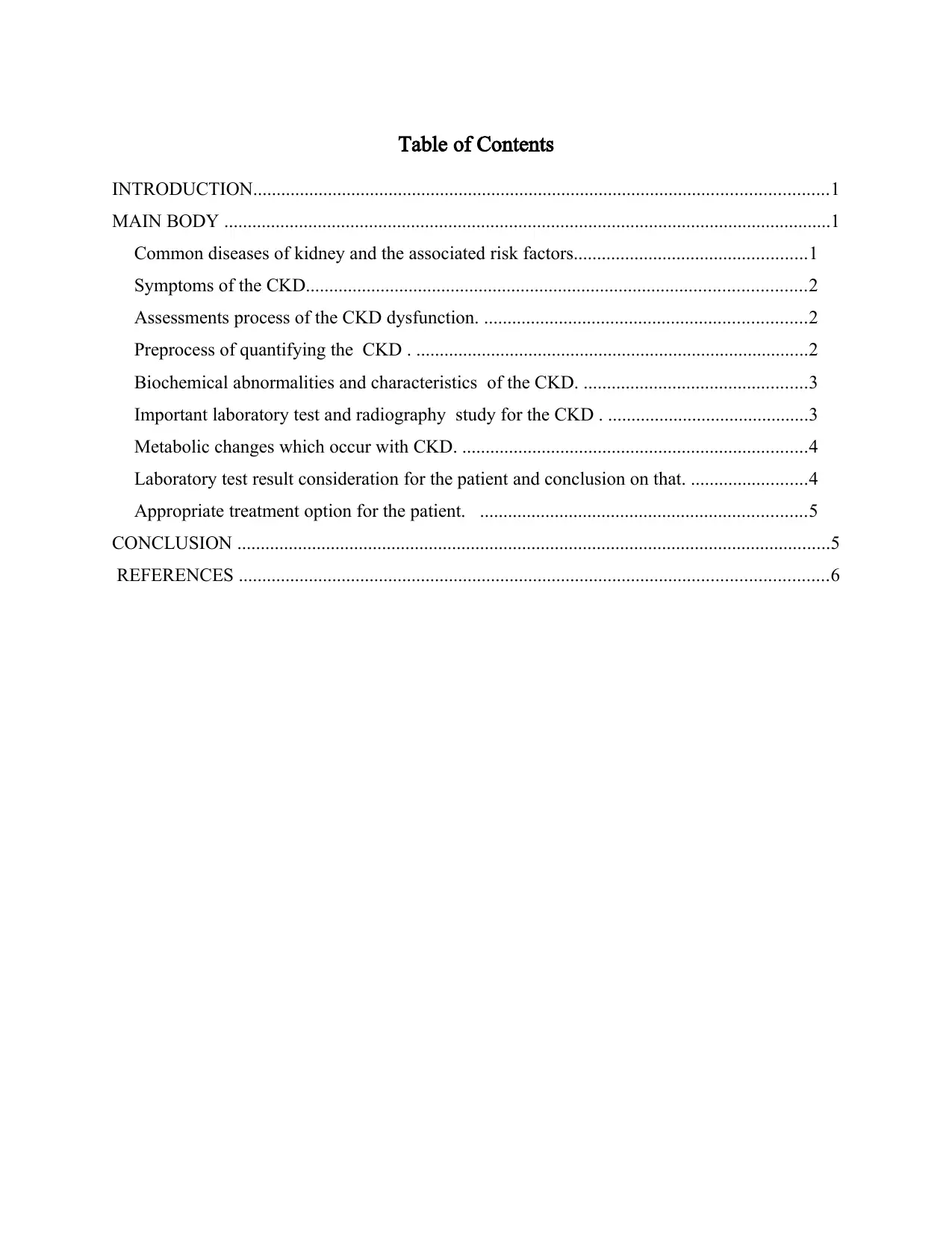
Table of Contents
INTRODUCTION...........................................................................................................................1
MAIN BODY ..................................................................................................................................1
Common diseases of kidney and the associated risk factors..................................................1
Symptoms of the CKD...........................................................................................................2
Assessments process of the CKD dysfunction. .....................................................................2
Preprocess of quantifying the CKD . ....................................................................................2
Biochemical abnormalities and characteristics of the CKD. ................................................3
Important laboratory test and radiography study for the CKD . ...........................................3
Metabolic changes which occur with CKD. ..........................................................................4
Laboratory test result consideration for the patient and conclusion on that. .........................4
Appropriate treatment option for the patient. ......................................................................5
CONCLUSION ...............................................................................................................................5
REFERENCES ..............................................................................................................................6
INTRODUCTION...........................................................................................................................1
MAIN BODY ..................................................................................................................................1
Common diseases of kidney and the associated risk factors..................................................1
Symptoms of the CKD...........................................................................................................2
Assessments process of the CKD dysfunction. .....................................................................2
Preprocess of quantifying the CKD . ....................................................................................2
Biochemical abnormalities and characteristics of the CKD. ................................................3
Important laboratory test and radiography study for the CKD . ...........................................3
Metabolic changes which occur with CKD. ..........................................................................4
Laboratory test result consideration for the patient and conclusion on that. .........................4
Appropriate treatment option for the patient. ......................................................................5
CONCLUSION ...............................................................................................................................5
REFERENCES ..............................................................................................................................6
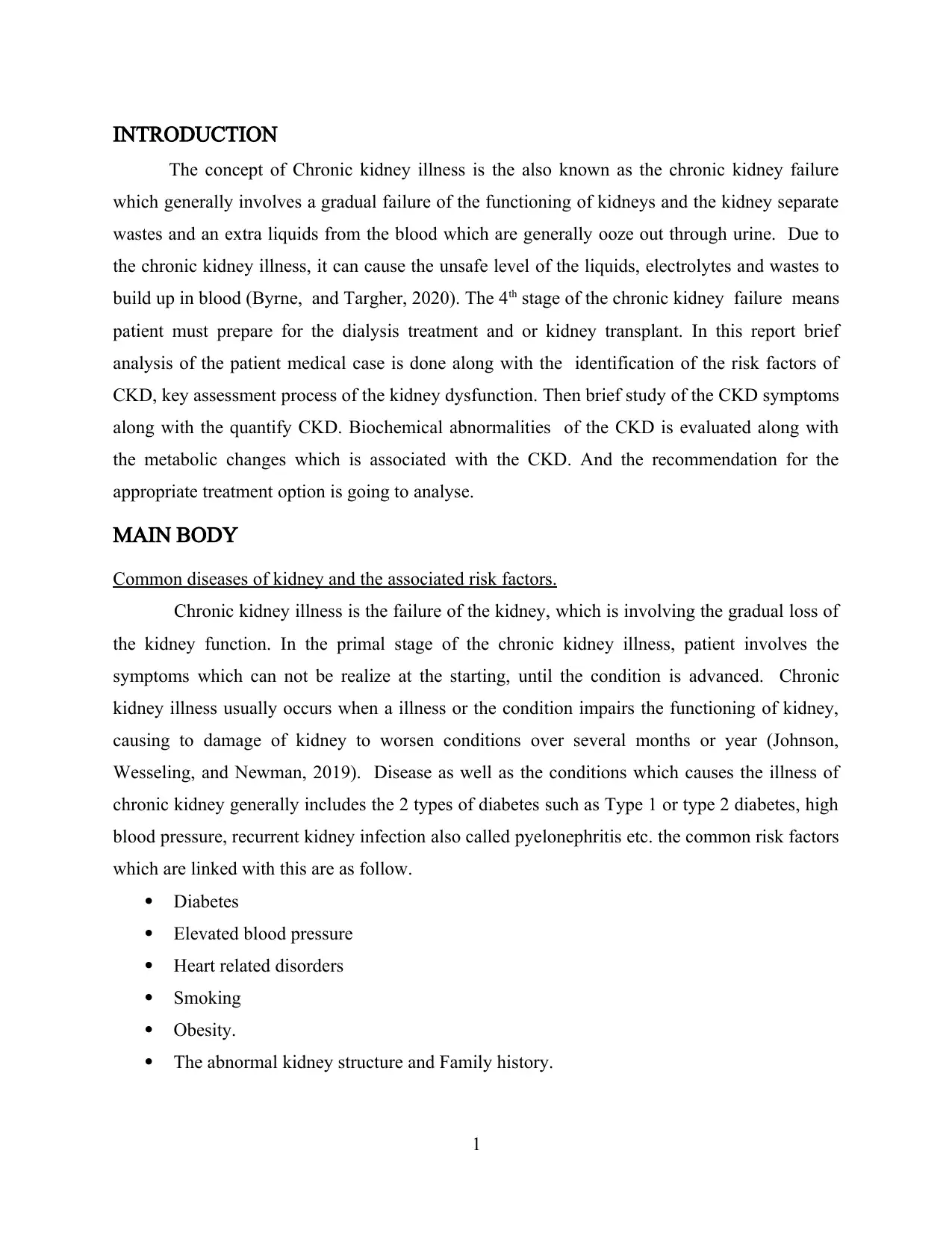
INTRODUCTION
The concept of Chronic kidney illness is the also known as the chronic kidney failure
which generally involves a gradual failure of the functioning of kidneys and the kidney separate
wastes and an extra liquids from the blood which are generally ooze out through urine. Due to
the chronic kidney illness, it can cause the unsafe level of the liquids, electrolytes and wastes to
build up in blood (Byrne, and Targher, 2020). The 4th stage of the chronic kidney failure means
patient must prepare for the dialysis treatment and or kidney transplant. In this report brief
analysis of the patient medical case is done along with the identification of the risk factors of
CKD, key assessment process of the kidney dysfunction. Then brief study of the CKD symptoms
along with the quantify CKD. Biochemical abnormalities of the CKD is evaluated along with
the metabolic changes which is associated with the CKD. And the recommendation for the
appropriate treatment option is going to analyse.
MAIN BODY
Common diseases of kidney and the associated risk factors.
Chronic kidney illness is the failure of the kidney, which is involving the gradual loss of
the kidney function. In the primal stage of the chronic kidney illness, patient involves the
symptoms which can not be realize at the starting, until the condition is advanced. Chronic
kidney illness usually occurs when a illness or the condition impairs the functioning of kidney,
causing to damage of kidney to worsen conditions over several months or year (Johnson,
Wesseling, and Newman, 2019). Disease as well as the conditions which causes the illness of
chronic kidney generally includes the 2 types of diabetes such as Type 1 or type 2 diabetes, high
blood pressure, recurrent kidney infection also called pyelonephritis etc. the common risk factors
which are linked with this are as follow.
Diabetes
Elevated blood pressure
Heart related disorders
Smoking
Obesity.
The abnormal kidney structure and Family history.
1
The concept of Chronic kidney illness is the also known as the chronic kidney failure
which generally involves a gradual failure of the functioning of kidneys and the kidney separate
wastes and an extra liquids from the blood which are generally ooze out through urine. Due to
the chronic kidney illness, it can cause the unsafe level of the liquids, electrolytes and wastes to
build up in blood (Byrne, and Targher, 2020). The 4th stage of the chronic kidney failure means
patient must prepare for the dialysis treatment and or kidney transplant. In this report brief
analysis of the patient medical case is done along with the identification of the risk factors of
CKD, key assessment process of the kidney dysfunction. Then brief study of the CKD symptoms
along with the quantify CKD. Biochemical abnormalities of the CKD is evaluated along with
the metabolic changes which is associated with the CKD. And the recommendation for the
appropriate treatment option is going to analyse.
MAIN BODY
Common diseases of kidney and the associated risk factors.
Chronic kidney illness is the failure of the kidney, which is involving the gradual loss of
the kidney function. In the primal stage of the chronic kidney illness, patient involves the
symptoms which can not be realize at the starting, until the condition is advanced. Chronic
kidney illness usually occurs when a illness or the condition impairs the functioning of kidney,
causing to damage of kidney to worsen conditions over several months or year (Johnson,
Wesseling, and Newman, 2019). Disease as well as the conditions which causes the illness of
chronic kidney generally includes the 2 types of diabetes such as Type 1 or type 2 diabetes, high
blood pressure, recurrent kidney infection also called pyelonephritis etc. the common risk factors
which are linked with this are as follow.
Diabetes
Elevated blood pressure
Heart related disorders
Smoking
Obesity.
The abnormal kidney structure and Family history.
1
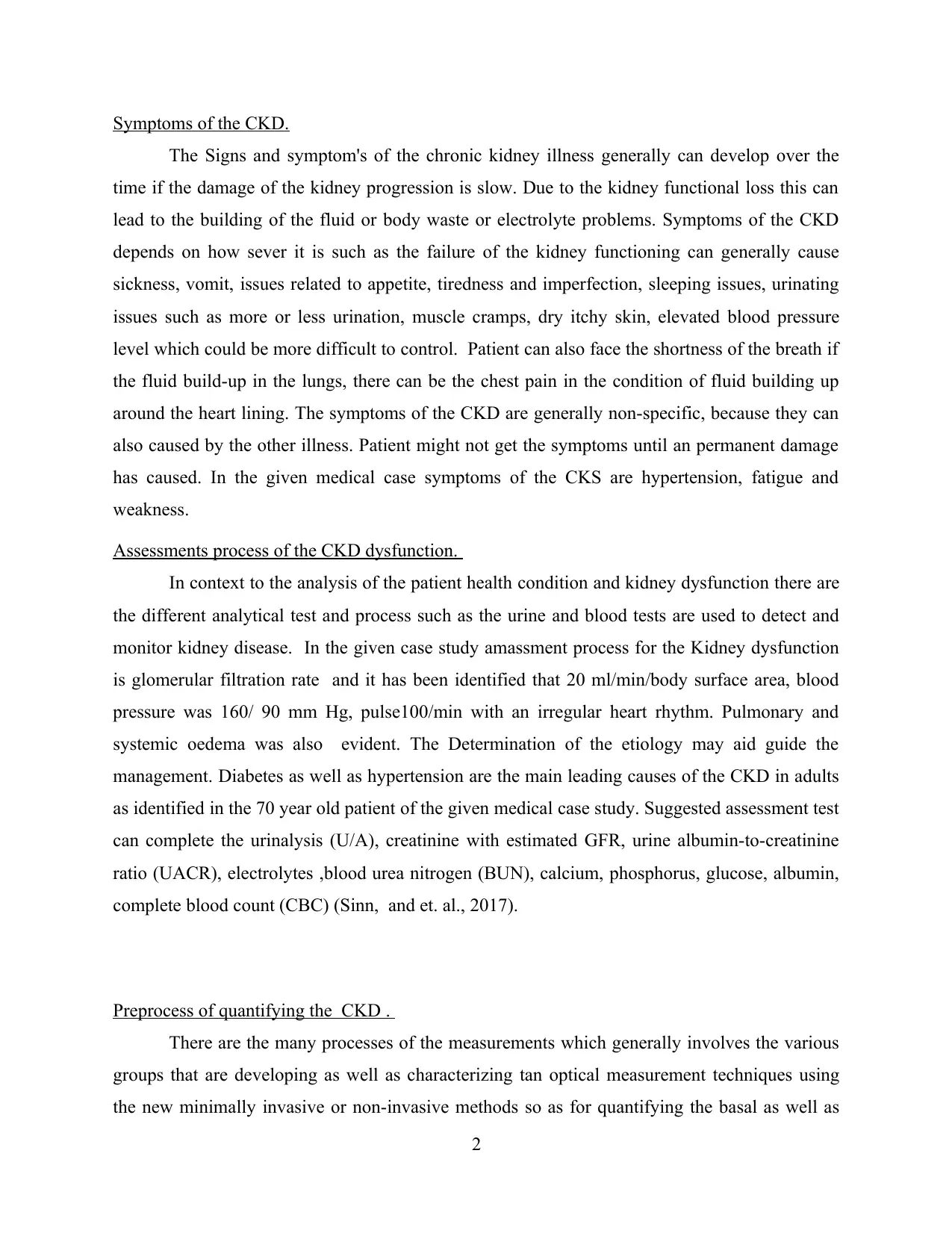
Symptoms of the CKD.
The Signs and symptom's of the chronic kidney illness generally can develop over the
time if the damage of the kidney progression is slow. Due to the kidney functional loss this can
lead to the building of the fluid or body waste or electrolyte problems. Symptoms of the CKD
depends on how sever it is such as the failure of the kidney functioning can generally cause
sickness, vomit, issues related to appetite, tiredness and imperfection, sleeping issues, urinating
issues such as more or less urination, muscle cramps, dry itchy skin, elevated blood pressure
level which could be more difficult to control. Patient can also face the shortness of the breath if
the fluid build-up in the lungs, there can be the chest pain in the condition of fluid building up
around the heart lining. The symptoms of the CKD are generally non-specific, because they can
also caused by the other illness. Patient might not get the symptoms until an permanent damage
has caused. In the given medical case symptoms of the CKS are hypertension, fatigue and
weakness.
Assessments process of the CKD dysfunction.
In context to the analysis of the patient health condition and kidney dysfunction there are
the different analytical test and process such as the urine and blood tests are used to detect and
monitor kidney disease. In the given case study amassment process for the Kidney dysfunction
is glomerular filtration rate and it has been identified that 20 ml/min/body surface area, blood
pressure was 160/ 90 mm Hg, pulse100/min with an irregular heart rhythm. Pulmonary and
systemic oedema was also evident. The Determination of the etiology may aid guide the
management. Diabetes as well as hypertension are the main leading causes of the CKD in adults
as identified in the 70 year old patient of the given medical case study. Suggested assessment test
can complete the urinalysis (U/A), creatinine with estimated GFR, urine albumin-to-creatinine
ratio (UACR), electrolytes ,blood urea nitrogen (BUN), calcium, phosphorus, glucose, albumin,
complete blood count (CBC) (Sinn, and et. al., 2017).
Preprocess of quantifying the CKD .
There are the many processes of the measurements which generally involves the various
groups that are developing as well as characterizing tan optical measurement techniques using
the new minimally invasive or non-invasive methods so as for quantifying the basal as well as
2
The Signs and symptom's of the chronic kidney illness generally can develop over the
time if the damage of the kidney progression is slow. Due to the kidney functional loss this can
lead to the building of the fluid or body waste or electrolyte problems. Symptoms of the CKD
depends on how sever it is such as the failure of the kidney functioning can generally cause
sickness, vomit, issues related to appetite, tiredness and imperfection, sleeping issues, urinating
issues such as more or less urination, muscle cramps, dry itchy skin, elevated blood pressure
level which could be more difficult to control. Patient can also face the shortness of the breath if
the fluid build-up in the lungs, there can be the chest pain in the condition of fluid building up
around the heart lining. The symptoms of the CKD are generally non-specific, because they can
also caused by the other illness. Patient might not get the symptoms until an permanent damage
has caused. In the given medical case symptoms of the CKS are hypertension, fatigue and
weakness.
Assessments process of the CKD dysfunction.
In context to the analysis of the patient health condition and kidney dysfunction there are
the different analytical test and process such as the urine and blood tests are used to detect and
monitor kidney disease. In the given case study amassment process for the Kidney dysfunction
is glomerular filtration rate and it has been identified that 20 ml/min/body surface area, blood
pressure was 160/ 90 mm Hg, pulse100/min with an irregular heart rhythm. Pulmonary and
systemic oedema was also evident. The Determination of the etiology may aid guide the
management. Diabetes as well as hypertension are the main leading causes of the CKD in adults
as identified in the 70 year old patient of the given medical case study. Suggested assessment test
can complete the urinalysis (U/A), creatinine with estimated GFR, urine albumin-to-creatinine
ratio (UACR), electrolytes ,blood urea nitrogen (BUN), calcium, phosphorus, glucose, albumin,
complete blood count (CBC) (Sinn, and et. al., 2017).
Preprocess of quantifying the CKD .
There are the many processes of the measurements which generally involves the various
groups that are developing as well as characterizing tan optical measurement techniques using
the new minimally invasive or non-invasive methods so as for quantifying the basal as well as
2
Secure Best Marks with AI Grader
Need help grading? Try our AI Grader for instant feedback on your assignments.
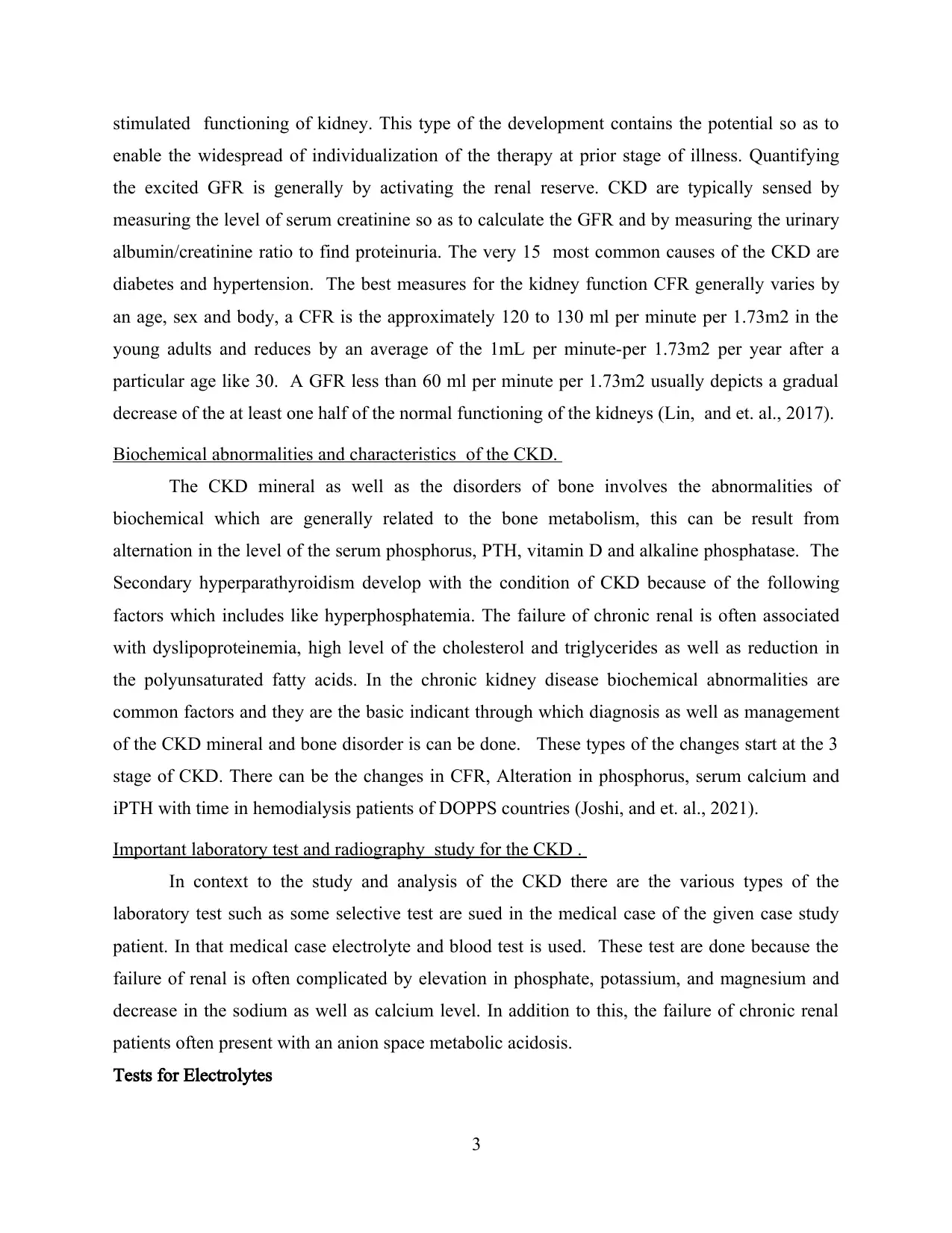
stimulated functioning of kidney. This type of the development contains the potential so as to
enable the widespread of individualization of the therapy at prior stage of illness. Quantifying
the excited GFR is generally by activating the renal reserve. CKD are typically sensed by
measuring the level of serum creatinine so as to calculate the GFR and by measuring the urinary
albumin/creatinine ratio to find proteinuria. The very 15 most common causes of the CKD are
diabetes and hypertension. The best measures for the kidney function CFR generally varies by
an age, sex and body, a CFR is the approximately 120 to 130 ml per minute per 1.73m2 in the
young adults and reduces by an average of the 1mL per minute-per 1.73m2 per year after a
particular age like 30. A GFR less than 60 ml per minute per 1.73m2 usually depicts a gradual
decrease of the at least one half of the normal functioning of the kidneys (Lin, and et. al., 2017).
Biochemical abnormalities and characteristics of the CKD.
The CKD mineral as well as the disorders of bone involves the abnormalities of
biochemical which are generally related to the bone metabolism, this can be result from
alternation in the level of the serum phosphorus, PTH, vitamin D and alkaline phosphatase. The
Secondary hyperparathyroidism develop with the condition of CKD because of the following
factors which includes like hyperphosphatemia. The failure of chronic renal is often associated
with dyslipoproteinemia, high level of the cholesterol and triglycerides as well as reduction in
the polyunsaturated fatty acids. In the chronic kidney disease biochemical abnormalities are
common factors and they are the basic indicant through which diagnosis as well as management
of the CKD mineral and bone disorder is can be done. These types of the changes start at the 3
stage of CKD. There can be the changes in CFR, Alteration in phosphorus, serum calcium and
iPTH with time in hemodialysis patients of DOPPS countries (Joshi, and et. al., 2021).
Important laboratory test and radiography study for the CKD .
In context to the study and analysis of the CKD there are the various types of the
laboratory test such as some selective test are sued in the medical case of the given case study
patient. In that medical case electrolyte and blood test is used. These test are done because the
failure of renal is often complicated by elevation in phosphate, potassium, and magnesium and
decrease in the sodium as well as calcium level. In addition to this, the failure of chronic renal
patients often present with an anion space metabolic acidosis.
Tests for Electrolytes
3
enable the widespread of individualization of the therapy at prior stage of illness. Quantifying
the excited GFR is generally by activating the renal reserve. CKD are typically sensed by
measuring the level of serum creatinine so as to calculate the GFR and by measuring the urinary
albumin/creatinine ratio to find proteinuria. The very 15 most common causes of the CKD are
diabetes and hypertension. The best measures for the kidney function CFR generally varies by
an age, sex and body, a CFR is the approximately 120 to 130 ml per minute per 1.73m2 in the
young adults and reduces by an average of the 1mL per minute-per 1.73m2 per year after a
particular age like 30. A GFR less than 60 ml per minute per 1.73m2 usually depicts a gradual
decrease of the at least one half of the normal functioning of the kidneys (Lin, and et. al., 2017).
Biochemical abnormalities and characteristics of the CKD.
The CKD mineral as well as the disorders of bone involves the abnormalities of
biochemical which are generally related to the bone metabolism, this can be result from
alternation in the level of the serum phosphorus, PTH, vitamin D and alkaline phosphatase. The
Secondary hyperparathyroidism develop with the condition of CKD because of the following
factors which includes like hyperphosphatemia. The failure of chronic renal is often associated
with dyslipoproteinemia, high level of the cholesterol and triglycerides as well as reduction in
the polyunsaturated fatty acids. In the chronic kidney disease biochemical abnormalities are
common factors and they are the basic indicant through which diagnosis as well as management
of the CKD mineral and bone disorder is can be done. These types of the changes start at the 3
stage of CKD. There can be the changes in CFR, Alteration in phosphorus, serum calcium and
iPTH with time in hemodialysis patients of DOPPS countries (Joshi, and et. al., 2021).
Important laboratory test and radiography study for the CKD .
In context to the study and analysis of the CKD there are the various types of the
laboratory test such as some selective test are sued in the medical case of the given case study
patient. In that medical case electrolyte and blood test is used. These test are done because the
failure of renal is often complicated by elevation in phosphate, potassium, and magnesium and
decrease in the sodium as well as calcium level. In addition to this, the failure of chronic renal
patients often present with an anion space metabolic acidosis.
Tests for Electrolytes
3
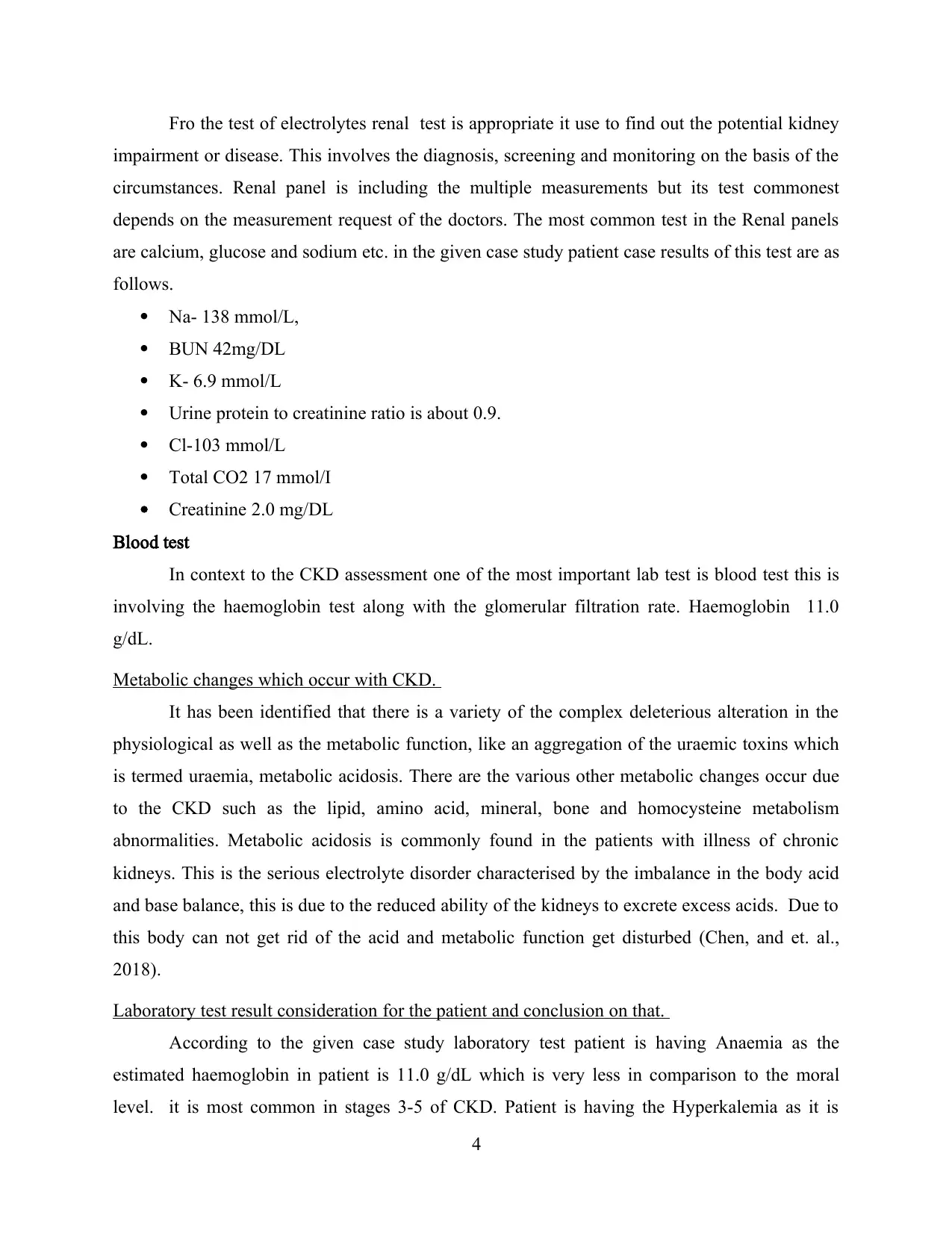
Fro the test of electrolytes renal test is appropriate it use to find out the potential kidney
impairment or disease. This involves the diagnosis, screening and monitoring on the basis of the
circumstances. Renal panel is including the multiple measurements but its test commonest
depends on the measurement request of the doctors. The most common test in the Renal panels
are calcium, glucose and sodium etc. in the given case study patient case results of this test are as
follows.
Na- 138 mmol/L,
BUN 42mg/DL
K- 6.9 mmol/L
Urine protein to creatinine ratio is about 0.9.
Cl-103 mmol/L
Total CO2 17 mmol/I
Creatinine 2.0 mg/DL
Blood test
In context to the CKD assessment one of the most important lab test is blood test this is
involving the haemoglobin test along with the glomerular filtration rate. Haemoglobin 11.0
g/dL.
Metabolic changes which occur with CKD.
It has been identified that there is a variety of the complex deleterious alteration in the
physiological as well as the metabolic function, like an aggregation of the uraemic toxins which
is termed uraemia, metabolic acidosis. There are the various other metabolic changes occur due
to the CKD such as the lipid, amino acid, mineral, bone and homocysteine metabolism
abnormalities. Metabolic acidosis is commonly found in the patients with illness of chronic
kidneys. This is the serious electrolyte disorder characterised by the imbalance in the body acid
and base balance, this is due to the reduced ability of the kidneys to excrete excess acids. Due to
this body can not get rid of the acid and metabolic function get disturbed (Chen, and et. al.,
2018).
Laboratory test result consideration for the patient and conclusion on that.
According to the given case study laboratory test patient is having Anaemia as the
estimated haemoglobin in patient is 11.0 g/dL which is very less in comparison to the moral
level. it is most common in stages 3-5 of CKD. Patient is having the Hyperkalemia as it is
4
impairment or disease. This involves the diagnosis, screening and monitoring on the basis of the
circumstances. Renal panel is including the multiple measurements but its test commonest
depends on the measurement request of the doctors. The most common test in the Renal panels
are calcium, glucose and sodium etc. in the given case study patient case results of this test are as
follows.
Na- 138 mmol/L,
BUN 42mg/DL
K- 6.9 mmol/L
Urine protein to creatinine ratio is about 0.9.
Cl-103 mmol/L
Total CO2 17 mmol/I
Creatinine 2.0 mg/DL
Blood test
In context to the CKD assessment one of the most important lab test is blood test this is
involving the haemoglobin test along with the glomerular filtration rate. Haemoglobin 11.0
g/dL.
Metabolic changes which occur with CKD.
It has been identified that there is a variety of the complex deleterious alteration in the
physiological as well as the metabolic function, like an aggregation of the uraemic toxins which
is termed uraemia, metabolic acidosis. There are the various other metabolic changes occur due
to the CKD such as the lipid, amino acid, mineral, bone and homocysteine metabolism
abnormalities. Metabolic acidosis is commonly found in the patients with illness of chronic
kidneys. This is the serious electrolyte disorder characterised by the imbalance in the body acid
and base balance, this is due to the reduced ability of the kidneys to excrete excess acids. Due to
this body can not get rid of the acid and metabolic function get disturbed (Chen, and et. al.,
2018).
Laboratory test result consideration for the patient and conclusion on that.
According to the given case study laboratory test patient is having Anaemia as the
estimated haemoglobin in patient is 11.0 g/dL which is very less in comparison to the moral
level. it is most common in stages 3-5 of CKD. Patient is having the Hyperkalemia as it is
4
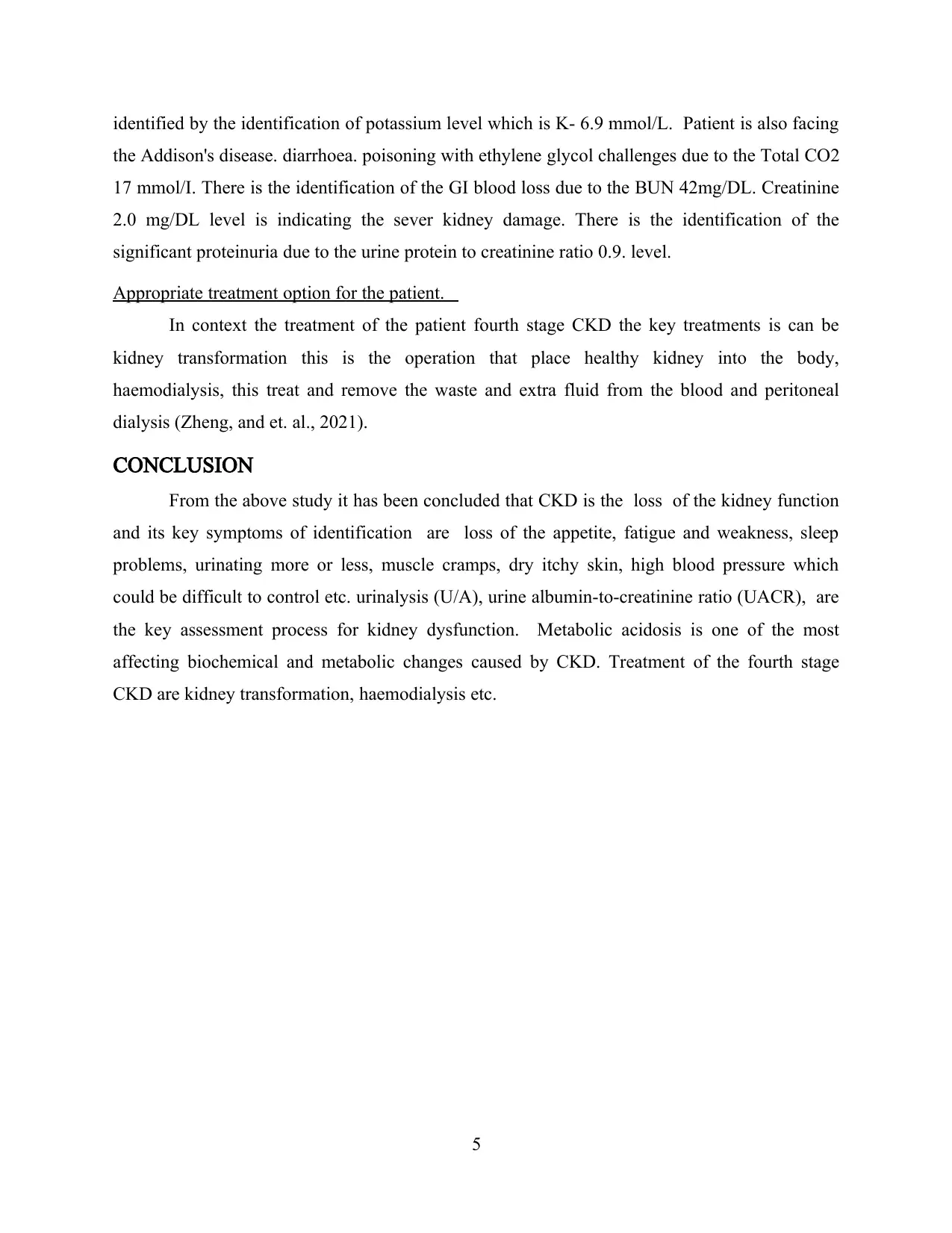
identified by the identification of potassium level which is K- 6.9 mmol/L. Patient is also facing
the Addison's disease. diarrhoea. poisoning with ethylene glycol challenges due to the Total CO2
17 mmol/I. There is the identification of the GI blood loss due to the BUN 42mg/DL. Creatinine
2.0 mg/DL level is indicating the sever kidney damage. There is the identification of the
significant proteinuria due to the urine protein to creatinine ratio 0.9. level.
Appropriate treatment option for the patient.
In context the treatment of the patient fourth stage CKD the key treatments is can be
kidney transformation this is the operation that place healthy kidney into the body,
haemodialysis, this treat and remove the waste and extra fluid from the blood and peritoneal
dialysis (Zheng, and et. al., 2021).
CONCLUSION
From the above study it has been concluded that CKD is the loss of the kidney function
and its key symptoms of identification are loss of the appetite, fatigue and weakness, sleep
problems, urinating more or less, muscle cramps, dry itchy skin, high blood pressure which
could be difficult to control etc. urinalysis (U/A), urine albumin-to-creatinine ratio (UACR), are
the key assessment process for kidney dysfunction. Metabolic acidosis is one of the most
affecting biochemical and metabolic changes caused by CKD. Treatment of the fourth stage
CKD are kidney transformation, haemodialysis etc.
5
the Addison's disease. diarrhoea. poisoning with ethylene glycol challenges due to the Total CO2
17 mmol/I. There is the identification of the GI blood loss due to the BUN 42mg/DL. Creatinine
2.0 mg/DL level is indicating the sever kidney damage. There is the identification of the
significant proteinuria due to the urine protein to creatinine ratio 0.9. level.
Appropriate treatment option for the patient.
In context the treatment of the patient fourth stage CKD the key treatments is can be
kidney transformation this is the operation that place healthy kidney into the body,
haemodialysis, this treat and remove the waste and extra fluid from the blood and peritoneal
dialysis (Zheng, and et. al., 2021).
CONCLUSION
From the above study it has been concluded that CKD is the loss of the kidney function
and its key symptoms of identification are loss of the appetite, fatigue and weakness, sleep
problems, urinating more or less, muscle cramps, dry itchy skin, high blood pressure which
could be difficult to control etc. urinalysis (U/A), urine albumin-to-creatinine ratio (UACR), are
the key assessment process for kidney dysfunction. Metabolic acidosis is one of the most
affecting biochemical and metabolic changes caused by CKD. Treatment of the fourth stage
CKD are kidney transformation, haemodialysis etc.
5
Paraphrase This Document
Need a fresh take? Get an instant paraphrase of this document with our AI Paraphraser
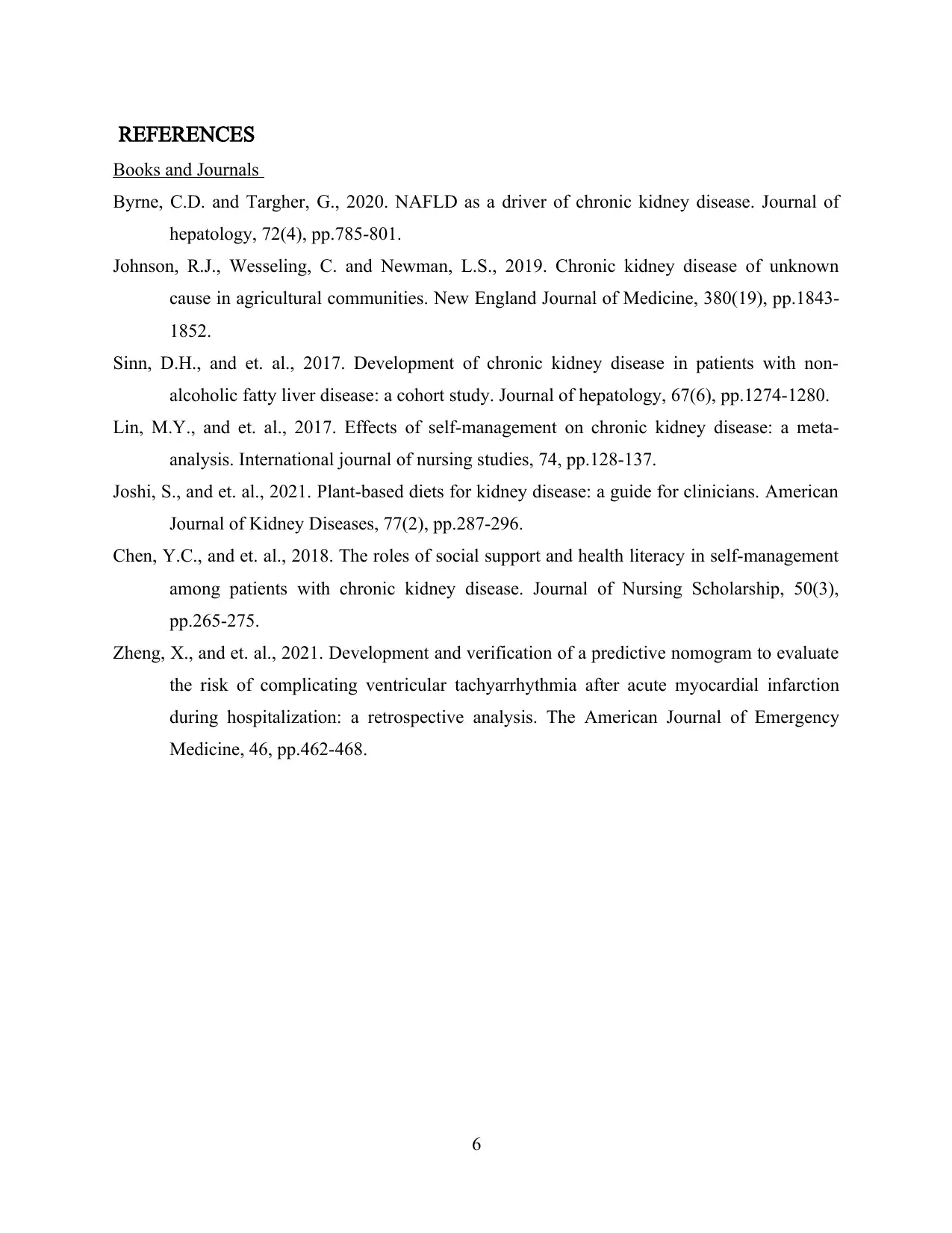
REFERENCES
Books and Journals
Byrne, C.D. and Targher, G., 2020. NAFLD as a driver of chronic kidney disease. Journal of
hepatology, 72(4), pp.785-801.
Johnson, R.J., Wesseling, C. and Newman, L.S., 2019. Chronic kidney disease of unknown
cause in agricultural communities. New England Journal of Medicine, 380(19), pp.1843-
1852.
Sinn, D.H., and et. al., 2017. Development of chronic kidney disease in patients with non-
alcoholic fatty liver disease: a cohort study. Journal of hepatology, 67(6), pp.1274-1280.
Lin, M.Y., and et. al., 2017. Effects of self-management on chronic kidney disease: a meta-
analysis. International journal of nursing studies, 74, pp.128-137.
Joshi, S., and et. al., 2021. Plant-based diets for kidney disease: a guide for clinicians. American
Journal of Kidney Diseases, 77(2), pp.287-296.
Chen, Y.C., and et. al., 2018. The roles of social support and health literacy in self‐management
among patients with chronic kidney disease. Journal of Nursing Scholarship, 50(3),
pp.265-275.
Zheng, X., and et. al., 2021. Development and verification of a predictive nomogram to evaluate
the risk of complicating ventricular tachyarrhythmia after acute myocardial infarction
during hospitalization: a retrospective analysis. The American Journal of Emergency
Medicine, 46, pp.462-468.
6
Books and Journals
Byrne, C.D. and Targher, G., 2020. NAFLD as a driver of chronic kidney disease. Journal of
hepatology, 72(4), pp.785-801.
Johnson, R.J., Wesseling, C. and Newman, L.S., 2019. Chronic kidney disease of unknown
cause in agricultural communities. New England Journal of Medicine, 380(19), pp.1843-
1852.
Sinn, D.H., and et. al., 2017. Development of chronic kidney disease in patients with non-
alcoholic fatty liver disease: a cohort study. Journal of hepatology, 67(6), pp.1274-1280.
Lin, M.Y., and et. al., 2017. Effects of self-management on chronic kidney disease: a meta-
analysis. International journal of nursing studies, 74, pp.128-137.
Joshi, S., and et. al., 2021. Plant-based diets for kidney disease: a guide for clinicians. American
Journal of Kidney Diseases, 77(2), pp.287-296.
Chen, Y.C., and et. al., 2018. The roles of social support and health literacy in self‐management
among patients with chronic kidney disease. Journal of Nursing Scholarship, 50(3),
pp.265-275.
Zheng, X., and et. al., 2021. Development and verification of a predictive nomogram to evaluate
the risk of complicating ventricular tachyarrhythmia after acute myocardial infarction
during hospitalization: a retrospective analysis. The American Journal of Emergency
Medicine, 46, pp.462-468.
6

7
1 out of 9
Related Documents
Your All-in-One AI-Powered Toolkit for Academic Success.
+13062052269
info@desklib.com
Available 24*7 on WhatsApp / Email
![[object Object]](/_next/static/media/star-bottom.7253800d.svg)
Unlock your academic potential
© 2024 | Zucol Services PVT LTD | All rights reserved.





